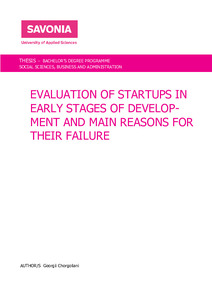Evaluation of Startups in Early Stages of Development and Main Reasons for Their Failure
Chorgoliani, Georgii (2023)
Chorgoliani, Georgii
2023
All rights reserved. This publication is copyrighted. You may download, display and print it for Your own personal use. Commercial use is prohibited.
Julkaisun pysyvä osoite on
https://urn.fi/URN:NBN:fi:amk-2023121336867
https://urn.fi/URN:NBN:fi:amk-2023121336867
Tiivistelmä
Startups face high levels of risk, with a majority of them failing in different stages of development. Instead of analysing successful companies, this research focuses on failed ventures. By listing common mistakes made by the founders, one can hedge the risks of uncertainty that follow every startup. The purpose of the research was to find the main reasons and factors that lead to early-stage startup failure.
The research was conducted by collecting qualitative data through interviews with founders and investors. All the participants in the research had experience working on a failed venture. Later, the data was transcribed and coded using a specific set of tools. The whole process was structured into smaller steps that are detailed in the research. First, secondary data was collected from the previously conducted research on the topic. Then this data was used to form a hypothesis of the research. To collect data, a panel of potential participants was created and contacted with an offer to participate in the research. The participants were asked a predetermined set of questions that were based on the hypothesis. The collected data was later transcribed and coded, in order to maximize the efficiency of the results.
The end result of the research is a list of factors and mistakes mentioned by the founders and investors. The mistakes come from the personal experience of the participants. The most common factors that affect early-stage startups are lack of customer and market research. Another factor is the relevance of the abilities, expertise, and personal traits of the founder. The founder is the one responsible for the decision-making in the venture. The decisions have to be made based on the relevant data that is collected during a market research. The founder then should apply the data correctly to create a product/service with the need on the market. If the collected data is falsified or the founder does not have the skills to apply this data, the startup has a greater risk of failure. There are also other external factors such as competition, team, partnerships, and misfortunes that should be considered. By analysing these factors and applying the gathered information, a founder might hedge the risk of failure, but not eliminate it completely.
The research was conducted by collecting qualitative data through interviews with founders and investors. All the participants in the research had experience working on a failed venture. Later, the data was transcribed and coded using a specific set of tools. The whole process was structured into smaller steps that are detailed in the research. First, secondary data was collected from the previously conducted research on the topic. Then this data was used to form a hypothesis of the research. To collect data, a panel of potential participants was created and contacted with an offer to participate in the research. The participants were asked a predetermined set of questions that were based on the hypothesis. The collected data was later transcribed and coded, in order to maximize the efficiency of the results.
The end result of the research is a list of factors and mistakes mentioned by the founders and investors. The mistakes come from the personal experience of the participants. The most common factors that affect early-stage startups are lack of customer and market research. Another factor is the relevance of the abilities, expertise, and personal traits of the founder. The founder is the one responsible for the decision-making in the venture. The decisions have to be made based on the relevant data that is collected during a market research. The founder then should apply the data correctly to create a product/service with the need on the market. If the collected data is falsified or the founder does not have the skills to apply this data, the startup has a greater risk of failure. There are also other external factors such as competition, team, partnerships, and misfortunes that should be considered. By analysing these factors and applying the gathered information, a founder might hedge the risk of failure, but not eliminate it completely.
